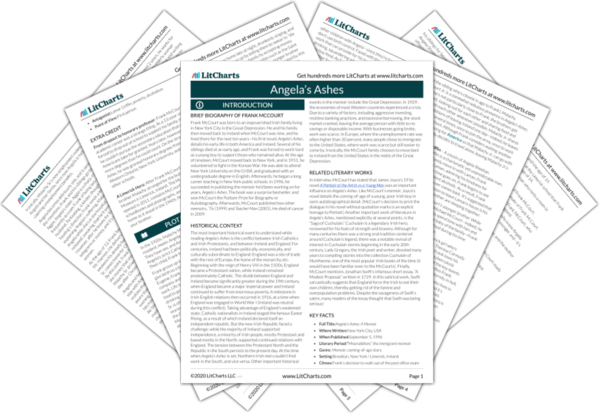Summary
Analysis
The next day, Frank wakes up in Ab Sheehan’s house. Ab gives him money to buy bread, tea, and milk. At the grocery store, Frank thinks about his future. He’ll have a job at the telegram office soon, meaning that he’ll have his own money. He’ll be able to buy newspapers and check out library books, and perhaps get his own place to stay.
As we begin this chapter, Frank seems like a changed man. After the low-point of the last chapter, Frank is now looking forward to his future: he has a job (something that wasn’t on his mind in Chapter 13), and he’s being taken care of by a caring uncle. As usual, in a crisis Frank falls back on his family.
Themes
For the next few months, Frank stays with Ab Sheehan. Angela and Michael visit him and ask him to come back to Laman’s house, but Frank, still angry, refuses. He imagines making money for himself and giving it to Michael, so that Michael will be able to own a proper pair of boots.
Frank is stubborn, a sure sign that he’s growing up and developing his own thoughts and feelings. He hates Laman for hitting him, and in broader terms, he hates Laman for being another version of Malachy Sr.: a charismatic but ultimately disappointing drunk.
Themes
Frank begins going on long walks. When he’s alone in the forests outside Limerick, he masturbates—a sin he’s afraid to confess to priests. Sometimes, when he walks around early in the morning, he’s able to feed himself—the milkman offers him broken eggs, which he always accepts and eats raw. Sometimes he also steals bread, which deliverymen have dropped off in fancy houses early in the morning. Frank takes the bread home to Ab Sheehan, who accepts it without question.
Frank commits “crimes” in this section, but they’re crimes only in a dogmatic sense. He’s stealing food from people who don’t really need them to survive: Frank’s need is greater than theirs. Frank has already expressed doubts about the merits of Catholicism, but he’ll continue to feel guilty about his own sexuality for a long time—clearly, years of Catholic education have made their mark on him.
Themes
Frank continues reading the Lives of the Saints. He learns bizarre, sometimes explicit details about the saints—details his teachers never shared. Saint Ursula, for example, supposedly allowed 11,000 people to be murdered instead of agreeing to marry a Hun. Frank becomes confused by God’s rules—it seems strange that Ursula could be a saint after allowing innocent people to be killed. He reads books about Chinese culture that discuss the free sexuality of the Chinese. The librarian refuses to let Frank read more than a few of these books, as she claims that the Chinese are an evil, “slanty-eyed” race.
Frank’s self-education through reading is one of the most important factors in leading him to question his Catholicism and his place in Limerick. He realizes that there are alternatives to the strict repressiveness of Irish Catholicism, represented by the supposed freedom of Asia. He also becomes aware of the prejudice and small-mindedness of his peers—their fear and hatred of the Northern Irish also extends to other races as well.
Themes
Get the entire Angela’s Ashes LitChart as a printable PDF.

Frank is about to turn fourteen. He’s found a job at the telegram office, which he’ll be able to start after his birthday. He prepares for his job by washing his clothes, which he’s stained from a wet dream, and grooming himself in front of a mirror. Because Frank is waiting for his clothing to dry, he’s forced to wear the only other clothing he can find in Ab’s home—an old dress that once belonged to Margaret Sheehan. The next morning, he wakes up to find that his clothes still aren’t dried—as a result, he’s forced to walk to the grocery store in his grandmother’s dress. Dozens of people giggle and laugh at him. During his walk to the store, Frank crosses paths with Aunt Aggie, who laughs at his ridiculous appearance. Nevertheless, when Frank explains to her that he’s about to begin a job and start making money for himself, she replies, “That’s more than your father would do.”
For the time being, Frank represses his sexual desires, aptly symbolized by his decision to wash his clothing, concealing the evidence of his embarrassing wet dream. He’s made a kind of temporary truce with Catholicism, and with his community—he’ll remain a resident of Limerick and work hard, at least for the time being, and he’ll continue to indulge his sexual desires while also confessing them and feeling guilty about them. It’s reassuring to hear Aunt Aggie, who’s always been harsh and even cruel to Frank, praising him for his hard work.
Themes












